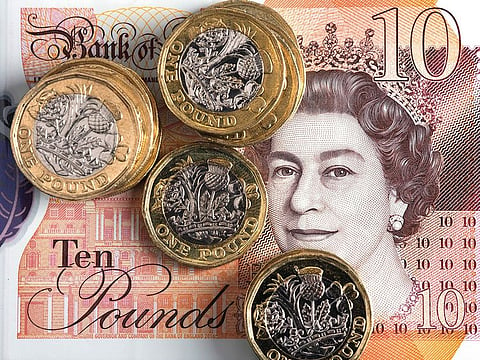Things are looking up for the Pound, strategists say
There is now just a 9% chance that the UK will leave the EU without an agreement

London: The pound is outperforming peers this year and as fears of a no-deal Brexit recede, strategists see all signs pointing to more strength.
There is now just a 9 per cent chance that the UK will leave the European Union at the end of March without an agreement, according to a Bloomberg survey of banks. Much more likely is that Britain’s exit will be delayed or even that Prime Minister Theresa May’s beleaguered deal will get through Parliament, both of which are seen pushing the pound higher.
Survey respondents see a 54 per cent probability of a delay beyond March 29, pushing the pound up to $1.33 (Dh4.8). The next most likely scenario is that May somehow gets her deal through a fractured House of Commons, with a 37 per cent chance. That’s also seen by the banks as the best scenario for the pound, fuelling a rally $1.38 — a level not seen since April 2018.
“The wind is blowing a bit more favourably thanks to the realisation that the deadline is approaching,” said Kenneth Broux, a strategist at Societe Generale SA. “The pound is now effectively trading an Article 50 extension but confirmation can give the pound another short-term lift.”
The Bloomberg survey included 16 banks. While average estimates were used for the probabilities of Brexit scenarios, medians were used for pound forecasts. The UK currency was around $1.3190 on Tuesday.
Reduced risk
The probability of a no-deal Brexit has fallen to just below 10 per cent, according to the survey, from a one in five chance in a similar poll conducted in January. This may seem a paradox with just weeks to go until Britain’s planned exit, but the confidence comes from May’s decision to offer Parliament a vote on alternatives if her plan doesn’t get enough support.
The pound has rallied more than 3 per cent versus the dollar and almost 5 per cent versus the euro this year, as the market has priced out the odds of Britain leaving the bloc without an agreement. The latest CFTC data show the market still had a net short position in the UK currency as of February 19, suggesting there could be more room for optimistic rebalancing.
Goldman Sachs is betting on further sterling gains, predicting that the currency’s rally will continue as foreign investors unwind the hedges they have put in place since the June 2016 Brexit vote. Long positions in the pound are now looking the most crowded trade, especially in the options markets, said Brian Friedman, Goldman’s global head of market strategies.
Still, not everyone is feeling so confident. There’s a risk the market is too complacent on a no-deal Brexit, according to Rabobank’s head of currency strategy Jane Foley.
“One thing that worries me about the way sterling trades is — it always seems to be more biased toward downplaying the risks of a hard Brexit,” she said. “The market was very confident that there would be a Remain vote and it got it wrong and sterling tumbled.”



